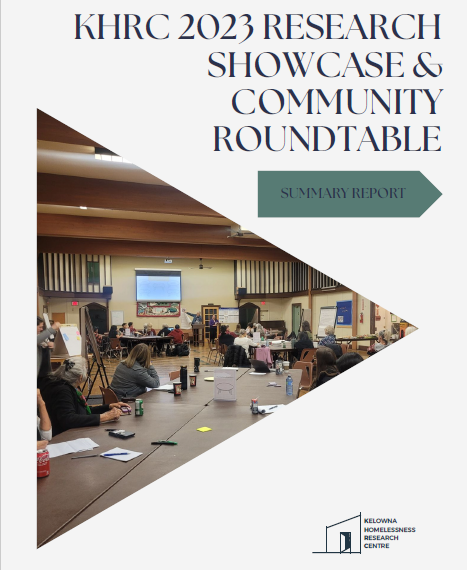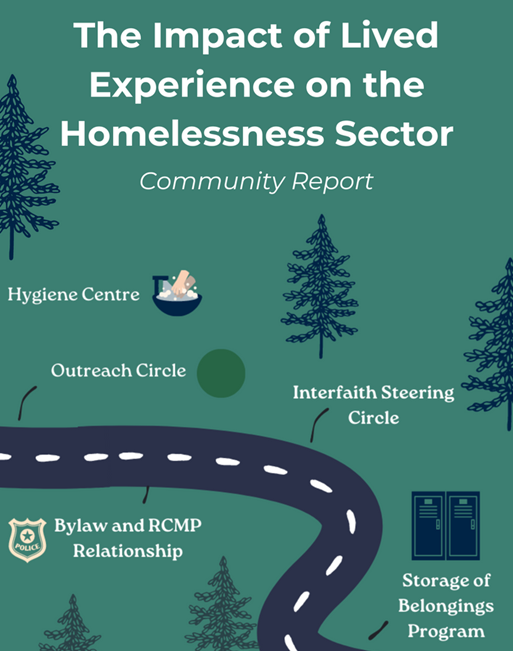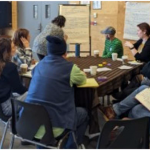KHRC is committed to communicating our research findings for all to use. Therefore, in addition to our academic Publications & Presentations we will continue to add to our below collection of community resources. Our Research Blog is another source of plain language summaries. The below reports span a range of topics:
- Allyship in Research
- Youth Homelessness / Resilience
- Homelessness & Migration
- Complex Care Housing & Supporting Key Populations
- Homelessness Vulnerabilities and Potential Mitigating Supports
- Supporting Sector Wages
- Rates of Homelessness in BC and Canada
- COVID-19: Interventions and Potential Impacts
- Poverty in the Okanagan (and across Canada)
- Addressing Homelessness in Smaller Cities
- Municipal Social Policy in Kelowna
KHRC 2023 Research Showcase & Community Roundtable: Summary Report
 On October 27th, 2023, we convened the KHRC Research Showcase and Community Roundtable, bringing together students, researchers, people with living and lived experience of homelessness, interested community members, and key stakeholders from a variety of agencies and organizations in Kelowna and the province of BC. We enjoyed a full day of showcasing outcomes of research related to homelessness, student poster presentations, and community roundtables / interactive discussions on topics including public health and homelessness, innovative practices, allyship in research, and the big hairy questions. This report provides a summary of the very rich discussions that took place during the event.
On October 27th, 2023, we convened the KHRC Research Showcase and Community Roundtable, bringing together students, researchers, people with living and lived experience of homelessness, interested community members, and key stakeholders from a variety of agencies and organizations in Kelowna and the province of BC. We enjoyed a full day of showcasing outcomes of research related to homelessness, student poster presentations, and community roundtables / interactive discussions on topics including public health and homelessness, innovative practices, allyship in research, and the big hairy questions. This report provides a summary of the very rich discussions that took place during the event.
The Impact of Lived Experience on the Homelessness Sector

This community-based research project was designed to support the Central Okanagan Journey Home Society (COJHS) and the Lived Experience Circle on Homelessness (LECoH) in identifying and evaluating the impact of LECoH from members own perspectives and the perspectives of service who have worked with LECoH on various projects and initiatives in Kelowna since the design process of the Journey Home Strategy in 2018.
Exploring Opportunities for Lived/Living Experience Circles
From co-researchers Rempel, Griffiths, Lloyd-Smith, Kelly, Hines, and Kirk (a team consisting of a mixture of PWLLE and student/community based researchers) comes a series of reports and a toolkit developed to support the work of communities, researchers, and others who are interested in community engaged processes for making social change. The Technical Report is a companion piece to a Community Report and a Toolkit for creating community based Lived Experience Circles (LECs).
- Community Report: Exploring Opportunities for a Penticton Lived/Living Experience Circle
- Technical Report: Research Process – Penticton LEC
- Toolkit for Communities: Considerations for Creating Lived Experience Circle on Homelessness
Housing for Seniors with Substance Use Needs: What are the Options?
 There is a growing number of older adults experiencing homelessness and substance use disorder. However, most addiction and homelessness services are currently geared towards a younger population. Michelle Hawkins, third year medical student, and Dr. Silvina Mema, Deputy Chief Medical Health Officer with Interior Health, explore what housing options are available for an aging population with substance use needs. This Kelowna based project included interviews with staff from Senior Living Communities, Supportive Recovery Assisted Living and Supportive Housing. This also included an interview with two residents of Supportive Housing older than 55 years of age. Substance use can be a disqualifying factor to accessing Senior Living Communities. At the same time, Supportive Housing facilities lack the supports to accommodate geriatric needs. The residents themselves thought Supportive Housing with supplemented supports provides the best environment. This project highlights some of the gaps in our system that make it difficult for seniors to transition from homelessness to an environment where their needs are met.
There is a growing number of older adults experiencing homelessness and substance use disorder. However, most addiction and homelessness services are currently geared towards a younger population. Michelle Hawkins, third year medical student, and Dr. Silvina Mema, Deputy Chief Medical Health Officer with Interior Health, explore what housing options are available for an aging population with substance use needs. This Kelowna based project included interviews with staff from Senior Living Communities, Supportive Recovery Assisted Living and Supportive Housing. This also included an interview with two residents of Supportive Housing older than 55 years of age. Substance use can be a disqualifying factor to accessing Senior Living Communities. At the same time, Supportive Housing facilities lack the supports to accommodate geriatric needs. The residents themselves thought Supportive Housing with supplemented supports provides the best environment. This project highlights some of the gaps in our system that make it difficult for seniors to transition from homelessness to an environment where their needs are met.
Allyship in Research
The Allyship in Research Toolkit provides researchers and practitioners with a framework to embed lived and living experience, and allyship, into their work. The toolkit describes ways to incorporate authentic participation into the entire research process or program development process, identifies strategies for engaging in a co-research/con-construction process, and outlines the benefits of practicing in this way. To accompany the toolkit, Creating Allyship in Research videos (short and long versions) are available that provide insight from those with experience in the area of homelessness – from service providers to those with lived experience of homeless – highlighting why allyship in research is needed. This toolkit was drafted by KHRC Co-Investigators Kyleen Myrah and Kerry Rempel, and KHRC’s Director of Operations Stephanie Laing.
- Allyship in Research Toolkit (August 9 2021)
- CAEH 2021 Conference Presentation
Housing Stock and Affordability
In an effort to synthesize and link to various sources of data and analysis related to housing and homelessness, the KHRC has been working to link community-specific information into comprehensive reports. While the bulk of currently available information is still grounded in the 2016 Census, these sources can still inform planning and programming as well as serving as a comparison point as updated products are released following the 2021 Census.
This first report provides a range of information specific to the Kelowna CMA / RDCO, including Core and Extreme Core Housing Need as well as Affordability more generally across regions, household type, and age, and also comments and considerations for local planning:
We look forward to pulling together similar information for other jurisdictions in the future.
Youth Homelessness, Resilience, and School Engagement in the Okanagan
This rapid data scan represents an incomplete collection of local data available on topics specific to youth. It pulls together links to various sources of information related to youth homelessness, resilience, school engagement, and other topics relevant to youth vulnerability in Kelowna, the Okanagan region, the province of British Columbia, and / or federally, depending on the availability of relevant data). This work was supported by Kyler Woodmass.
- Local Data Scan: Youth Homelessness, Resilience, and School Engagement in the Okanagan (March 22 2022)
Any feedback on this report (or other items), or suggestions for further additions can be submitted to: ask.khrc@ubc.ca
Homelessness & Migration
The goal of this project was to discuss and inform assumptions regarding migration and homelessness through a presentation and analysis of available evidence, primarily through the review of available Point-in-Time count reports. While the focus of the paper is the context of British Columbia (and features Kelowna data whenever possible), national and international figures and analysis are included throughout. Seven sections of supporting evidence and analysis are presented in the full report, followed by a discussion section. This work was supported by Kyler Woodmass.
- Summary Paper: Migration & Homelessness in Canadian Communities (Mar 7 2022)
- Full Report: Migration & Homelessness: A Summary of Evidence on Intraprovincial, Interprovincial, and International Migration across Canadian Communities (Mar 7 2022)
Complex Care Housing (and Key Populations)
The inclusion of additional funding for Complex Care Housing (CCH) sites across the province within BC’s 2022 Budget offers both a new model and new resources to communities seeking to address homelessness across the province, including tools to meet the needs and goals identified in Kelowna’s Journey Home Strategy. The below discussion paper summarizes what is known regarding CCH based on public announcements and last year’s Complex Needs Advocacy Paper, and discusses how this model might be applied to support three “key populations” identified within the Journey Home Strategy: Youth, Seniors, and Indigenous community members. This work was supported by Kyler Woodmass.
Homelessness Vulnerabilities and Potential Mitigating Supports
In the early months of 2020, members of the Kelowna Homelessness Research Collaborative (KHRC) and co-researchers from the Lived Experience Circle on Homelessness (LECoH) held a series of focus groups in Kelowna to talk about two important questions: 1) what events or circumstances put individuals at risk of becoming homeless, and 2) what could be done to lessen risk of homelessness? This was followed up by an online event in the fall of 2020 to engage both service providers and local academics in a discussion of potential community based projects to inform and address the identified vulnerabilities. The below summaries were prepared by Kerry Rempel, Dr. Kyleen Myrah, Stephanie Laing, and Kyler Woodmass, with the support of our our Lived Experience Co-Researchers, Sherry W. Landry and Dorothy Goodeye.
- Report A: Focus Group Findings (Aug 25 2020)
- Report B: Community Connection and Future Research Session (Nov 29 2020)
Supporting Sector Wages
Wages are consistently identified as a critical factor in recruiting, retaining, and supporting workers within the homelessness support sector. However, non-profits within our support sector must also stretch their finite grant funding as far as they can to maximize the number of vulnerable individuals supported by their programs. Raising wages across the sector will require a commitment to a new balance of resources shared across employer organizations as well as their grant writers and the funder organizations. This resource is intended to advance discussions related to this goal, and links to external resources that support the adoption of a $25 target wage within new grant applications and program renewals in the local sector (and, arguably, across communities). This target, above both the minimum wage and living wage rates, is in line with local evidence on cost of living and the overall objective of recruiting and retaining a strong, talented sector workforce. This work was supported by Kyler Woodmass.
- KHRC – A Case for a 25 Dollar Target Sector Wage (Nov 22 2021), a resource for discussion, advocacy, and to inform grant applications.
Rates of Homelessness in BC and Canada
Below represents an introductory commentary on sources of quantitative data on homelessness in Canada and in BC, possible metrics of successful community access, and initial considerations and limitations with existing data, collected by KHRC’s Associated Research Coordinator, Kyler Woodmass.
- KHRC Research Blog – Homelessness in BC’s Small- and Mid-Sized Communities (Sept 1, 2021)
- For context, see also:
- BC Housing Point in Time Counts
- Homeless Hub Community Profiles (a central source of individual community counts)
- Built for Zero – Community Progress
COVID-19: Interventions and Potential Impacts
Social, Economic, and Political Impacts of COVID-19
At the start of 2021, KHRC research staff conducted a brief snapshot of documented and forecasted impacts resulting from the pandemic, summarized by our Research Assistant Navreen Bilkhu and Associated Research Coordinator Kyler Woodmass:
- COVID-19 Fact Sheet – Impact and Opportunities (Jan 18 2021)
- For more information on homelessness planning and impacts, see COH Learning Hub [Pandemic Planning & Response: COVID-19]
- For information specific to the sector’s response in the Okanagan, see our paper: “COVID-19 and the Homelessness Support Sector: Perspectives on a Small Community’s Early Response to a Public Health Crisis“
Homelessness and Vaccinations
As a part of ongoing work to review peer-reviewed literature at the intersection of homelessness and pandemics (or other highly contagious illnesses like TB, influenza, etc.), KHRC conducted a brief scan of prior research and recommendations related to vaccination efforts applicable those experiencing homelessness or other “hard-to-reach” / “easy-to-miss” populations. This summary was extracted by Kyler Woodmass, based on the broader journal article (see KHRC Publications) advanced by Dr. Jordan Babando, Danika Quesnel, Arielle Lomness, and Dr. John Graham.
Poverty in the Okanagan
The State of Poverty (Policies & Data)
This overview presents a brief, non-exhaustive, semi-chronological guide to existing and planned data and policy on addressing poverty, at a federal level, at a provincial level within British Columbia, and at a regional level within the Central Okanagan. Summarized by Kyler Woodmass.
For more information on local and provincial poverty:
- Subscribe for updates on the Central Okanagan Poverty and Wellness Strategy Development on the Regional District of the Central Okanagan’s projects and initiatives page
- See also the United Way BC Page for the Central Okanagan Community Wellness Analysis
- BC continues to produce annual reporting on poverty indicators relevant to the TogetherBC Poverty Reduction Strategy:
- 2019 Annual Report
- 2020 Annual Report (published in the Fall of 2021, after the above KHRC resource)
- The stakeholder consultations that went into the strategy development are available online, including the full overview of the January 2018 community meeting on poverty reduction in Kelowna
Addressing Homelessness in Smaller Cities
- UBCO x Vernon Homelessness Strategy Report (2021). Earlier this year, undergraduate and graduate students within the Interdisciplinary Studies program at UBCO (Bethany Presley, Adam Kunis, Luz-Marina Roberts, Gaby Heschuk, Denae Weighill, Ayla De Grandpre, Echo Wang, Mitchell Gillette, Ayla Winston & Miranda McMullin), under the supervision of KHRC Investigator Dr. Jon Corbett (also Director of the Institute for Community Engaged Research) consulted with the Social Planning Council for the North Okanagan on opportunities for collaborative research that would contribute to the ongoing effort to address homelessness in the region. The first phase to that end was to conduct a literature review aimed to investigate domestic and international community homelessness strategies to identify a range of effective, actionable, and affordable homelessness projects and interventions for consideration. This report highlights a “menu” of fifteen different successful projects ranging from housing plans, investing, technology implementation, community involvement, strengthening services to infrastructure.
- Addressing homelessness in a smaller Canadian city : community-engaged research with Vernon, B.C. (2022). Cities across Canada are experiencing an increase in homelessness and are struggling to keep up with the needs of the growing homeless population. Smaller cities are no exception to this trend… Vernon, British Columbia (Vernon) is one of the many cities struggling to deal with homelessness without supports from the Federal Government. Concomitant to the exclusion of smaller cities, funding research has also prioritized homelessness in larger Canadian cities such as Toronto and Vancouver (Doberstein, 2012; Piat et al., 2015; To et al., 2016). As a result, little is known at the academic level around how smaller Canadian cities address homelessness with limited funding and capacity. Using a community-engaged methodology, I have partnered with Vernon to examine the ways in which the city addresses homelessness with minimal supports from the Federal Government. I hope that this research will put Vernon and other smaller Canadian cities on the academic radar, drawing attention to the challenges faced by smaller communities throughout the homelessness crisis. The goal of this research is to fill the gap in knowledge within academia around how smaller Canadian cities alleviate homelessness with limited funding and resources.
Municipal Social Policy in Kelowna
Municipal governments (and other forms of local governments, most notably Regional Districts in the case of British Columbia) have the daunting task of addressing the day-to-day lives of their citizens, facilitating a process of local engagement that can achieve a “sense of community among members” in a way that tempers “individual ambitions with concern for others”. As a complement to the City of Kelowna’s “Social Wellness” page on recent and emerging files, and in anticipation of a municipal Social Policy Framework later this year, KHRC has produced a report summarizing historical developments and understandings of social policy at a local level. Summarized by Kyler Woodmass.

